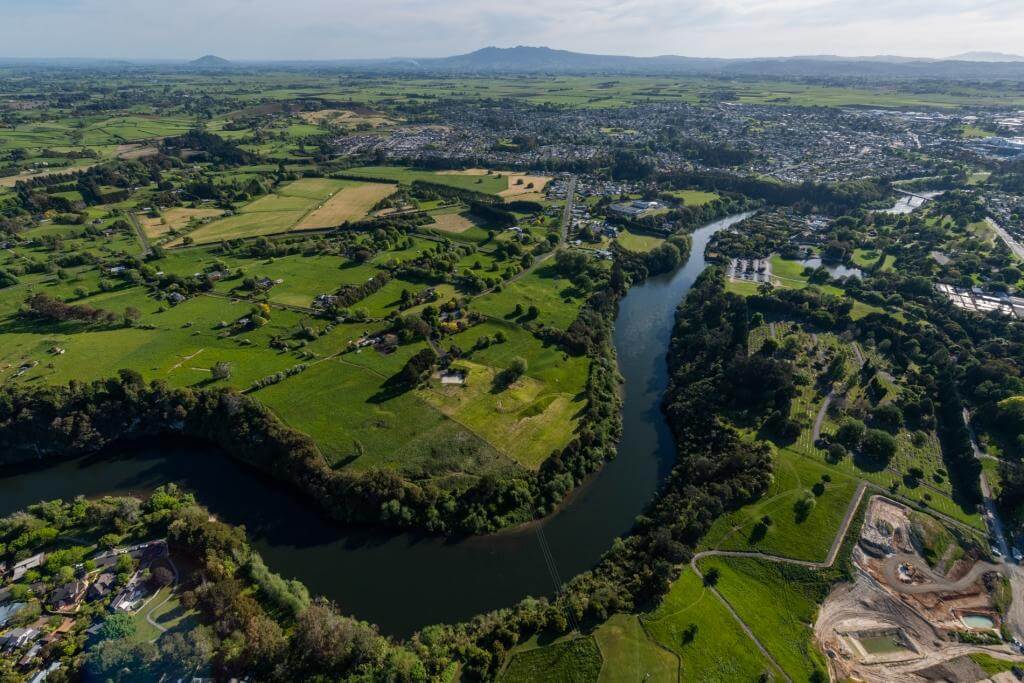Ko Taupiri te Maunga (Taupiri is the mountain)
Ko Waikato te Awa (Waikato the river)
Ko Potatau te tangata (Potatau the Man)Waikato taniwha rau (Waikato with its myriad taniwha)
He piko, he taniwha! (At each bend a taniwha!)
He piko he taniwha! (At each bend a taniwha!)
Following the signing of Te Tiriti o Waitangi/The Treaty of Waitangi in 1840, there was a period when in many places the promise of collaboration and co-opeation between Māori and Pākehā was being realised.
But then too many things began to unravel, particularly with the population explosion amongst the newcomers and their hunger for land and its resources. Māori leadership began to realise that despite the treaty, conflict was inevitable.
Many in that leadership saw that inter-tribal warfare was destructive, and that this external threat to Māori autonomy – mana Māori motuhake – could only be addressed if Māori were to unite. Much of that leadership through visits to Europe, England, Australia, had seen first-hand the advantages of a kingdom, united under one authority.
Consultations took place amongst them over more than a decade. It became clear to them that uniting the tribes under one ‘king’ would be ideal in their aspirations of retaining and maintaining Māori mana over their ‘taonga’, their properties; and of preserving Māori autonomy; and more, to stop inter-tribal bickering and warfare.
In 1856 Te Heuheu, rangatira of Ngāti Tuwharetoa, announced the convening of the meeting, Hinana ki Uta, Hinana ki Tai, on the shores of Lake Taupō in the heart of the North Island to which every major rangatira of Māoridom at that time was invited. There he pronounced these words, calling on every rangatira to support his view that Potatau, paramount chief of the Waikato, Tainui confederation of Iwi, should be King. Indeed, many rangatira when approached and invited to consider whether they might be King responded identifying themselves with prominent landmarks and waterways of their ‘homelands’.
Today the use of ‘pēpeha’ has become a common practice which people of Māori descent use to introduce themselves formally, asserting an identification with prominent landmarks and waterways. Interestingly, people of other ethnic persuasions are also using the ‘pēpeha’ to introduce and identify themselves, a practice most often welcomed amongst Māori.
I recently had the pleasure of meeting a Māori physiotherapist who had been born in Australia. As a young man he won a rugby scholarship with the Brumbies franchise, met with some considerable success there, but suffered injuries which curtailed his burgeoning career and, he confesses, threw him into a funk. He studied physiotherapy, became qualified in the field, and then decided that he would come to Aotearoa New Zealand to explore his roots. Learning and then reciting his pēpeha on his father’s home marae filled him with pride.
When Māori meet for the first time it is very unusual for one to ask the other ‘Who are you?’ The most likely first question is ‘Where are you from?’ In Māori, ‘Nō whea koe?’ which back translated can mean both ‘Where are you from?’ and ‘Where do you belong?’
The use of the pepeha by other-than-Māori is worthy of support as it opens the way for further conversations of related experiences of place, of mutual acquaintances, and the invitation to the development of mutually beneficial relationships.











